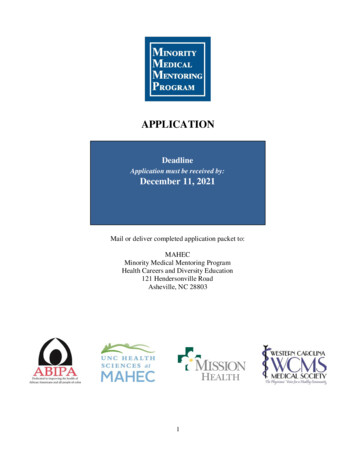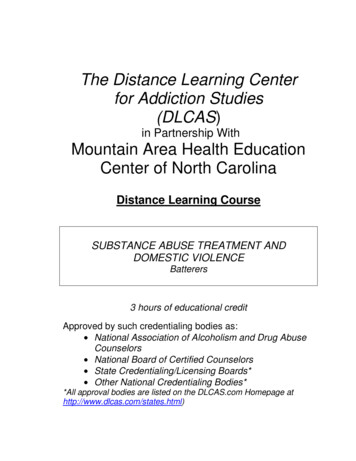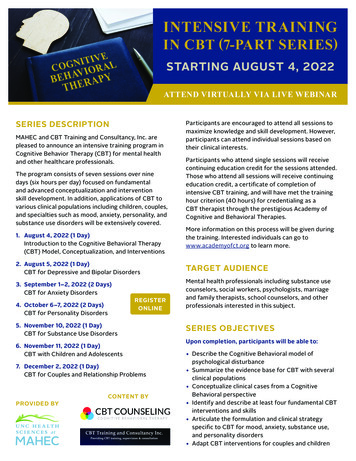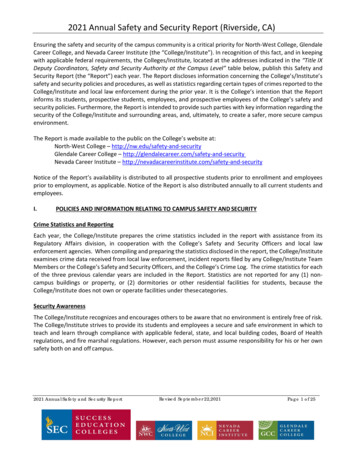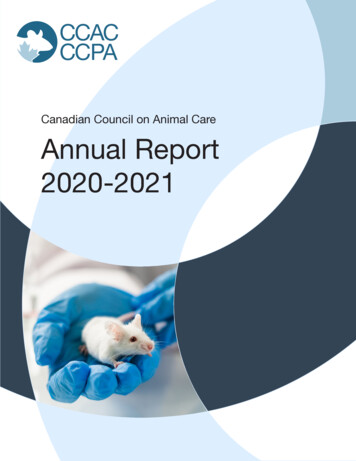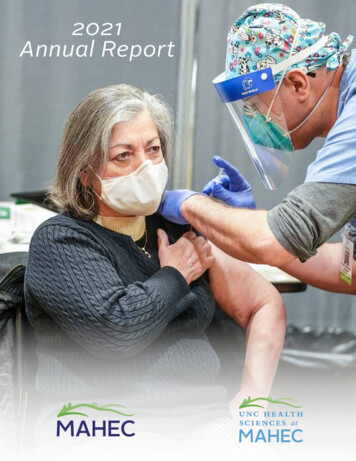
Transcription
2021Annual Report
On the CoverFrancisco Castelblanco, DNP, administers a COVID-19 vaccine at the community vaccination clinic at UNC Asheville.Photo sources:Front cover: Kevin Fuller, UNC Ashevillep. 4, right, courtesy of Hannah Robinsonp. 5 courtesy of UNC Ashevillep. 6 courtesy of Kathey Averyp. 7, top, courtesy of Leora Engel-Smithp. 9 courtesy of Bronwyn FademAll other photos by or property of MAHEC
Transforming Healthcare in Western North CarolinaThe Mountain Area Health Education Center (MAHEC) has been dedicated to improvinghealth in Western North Carolina since 1974 by creating a robust and well-qualifiedhealthcare workforce. MAHEC’s graduate medical education programs have trained651 medical and dental professionals to date, all with a passion for serving those livingin our region’s underserved communities. MAHEC’s family medicine, ob/gyn, internalmedicine, psychiatry, and dental practices improve access to care today while trainingthe workforce needed for tomorrow. And our continuing education programs supportthousands of healthcare providers across the state every year.In 2017, MAHEC and the University of North Carolina (UNC) expanded their partnershipthrough UNC Health Sciences at MAHEC, home to branch campuses and programsaffiliated with UNC School of Medicine, UNC Gillings School of Global Public Health,UNC Eshelman School of Pharmacy, and UNC Adams School of Dentistry. Our academichealth center is addressing Western North Carolina’s biggest health challenges—including COVID-19—by leveraging community partnerships, MAHEC’s expertise ingraduate medical education and interprofessional care, and UNC-Chapel Hill’s worldclass research and implementation science.The benefits of an interdisciplinary academic health center have never been moreapparent than in the midst of a global pandemic that has required communities aroundthe world to bring every resource to bear to mitigate the spread of a highly contagiousand deadly virus. That our region fared better than many during the pandemic is atestament to the power of UNC Health Sciences at MAHEC’s commitment to transformregional health through collaborative community-focused partnerships.MAHEC Board of DirectorsChair William R. Hathaway, MD; Vice Chair Alan D. Stiles, MD; Secretary-Treasurer Kenneth M. Partin; W. Louis Bissette, Jr.; Robert A. Blouin, PharmD;Carol Burton, PhD; Casey Cooper; Bruce Deighton, PhD; David P. Franklin, MD; Jeffery E. Heck, MD; James M. Kirby, II; Paul McDowell; Danielle Mahaffey, MD;Alfred J. Mina, MD; Joseph A. Pino, MD, MHA; Lindsey Rhoden, AIA; Laurie Stradley, PhD; Darin Waters, PhDUNC Health Sciences at MAHEC Oversight BoardVoting members: UNC Provost and Executive Vice Chancellor Robert A. Blouin, PharmD; UNC School of Medicine Executive Dean Cristy Page, MD, MPH;UNC SOM Interim Vice Dean of Academic Affairs Jennifer Wu, MD; UNC Gillings School of Global Public Health Senior Associate Dean Laura Linnan, ScD;UNC Eshelman School of Pharmacy Dean Angela Kashuba, PharmD; UNC Adams School of Dentistry Interim Dean Julie Byerly, MD, MPH;UNC Board of Governors, Former Chair, MAHEC Board Representative W. Louis Bissette, Jr; Cherokee Indian Hospital CEO Casey Cooper;and MAHEC CEO Jeffery E. Heck, MDNon-voting members: MAHEC CFO Zach Levin; UNC School of Medicine CFO Michael Sledge; UNC Asheville Chancellor Nancy J. Cable, PhD
Responding to Regional NeedsCOVID-19 Community Resource TeamCOVID-19 presented a once-in-a-lifetime opportunity to support emerging population health needs on anunprecedented scale. MAHEC faculty, staff, learners, and community partners rose to the challenge time and timeagain, collaborating in novel ways and adapting clinical training and educational curricula to meet real-world needsin real time. Early in the pandemic, UNC Health Sciences at MAHEC established a cross-departmental COVID-19Community Resource Team to rapidly identify community needs and resource them through:Regional COVID-19 datacollectionWorking with regional partners,UNC Health Sciences at MAHECdeveloped a data dashboardthat helped public health leaderscreate tailored mitigationstrategies for emergingCOVID-19 hotspots.Education and trainingContinuing professionaldevelopment programs andpractice support quicklypivoted to provide just-in-timetraining to support regionaltelehealth implementation andCOVID-19 testing, treatment, andvaccination.Trusted communitysupportThe WNC community healthworker initiative trained andsupported community membersacross the region in deliveringCOVID-19 prevention, health, andvaccine education to our region’smost vulnerable communities.2Testing implementationand supportIn addition to developing aMAHEC-based COVID-19 testingclinic, the testing team increasedregional capacity for early virusdetection through technicalassistance and mobile outreachto at-risk communities.Regional communicationcampaignPartnering with regional healthnetworks and foundations ensuredWestern North Carolinians hadongoing access to evidence-basedinformation for preventing COVID-19infection, severe illness, and death.Supply chaincoordination andvaccine accelerationThis nimble team worked withover 400 community partnersto address PPE and other supplyneeds then pivoted to acceleratethe equitable distribution ofvaccines across our region.
Driving Clinical InnovationInnovations TeamIn 2021, MAHEC created an Innovations Team to help healthcare providersrespond to rapidly changing healthcare needs. Working at an accelerated pace,the team helped establish the region’s first stand-alone monoclonal antibodyinfusion treatment center, a post-acute COVID-19 care clinic, and a large-scalecommunity vaccination clinic in partnership with UNC Asheville.“For the first timein a year, I havesome hope.”- Katherine CosimanoPost-Acute COVID Care Clinic accinations4425810,0002,600people with“Long COVID”treatedsurgical andKN95 masksdistributed80,000face coveringsto schools andnonprofits164,554COVID-19library guidesaccessed over11,969 timesparticipants in88 COVIDtrainingshealthprofessionalsreceivedmonthly odyinfusionsgownsdistributed8,900Learn more352COVIDeducationevents by 91student healthambassadors638,000residentsreached with“My ReasonWNC” socialmedia campaign“I always looked forward tobeing with this stellar team ofmedical professionals anduniversity staff. It made mypandemic experience a little lessstressful because I knew I washelping to make a difference, beingthere for others who probably hadnot been out of their house in ayear, likely full of fear. We providedthem hope and health.”- Candace BuckCommunity vaccination clinic volunteer3
Cultivating Local ExpertiseThe UNC Gillings School’s Master of Public Health (MPH) Program in AshevilleImpact DataCommunity partnersengaged in work study, practicum,and culminating experience projects17 Incoming students, the largest class, recruitedin 202128 community partners engaged across regionABCCM Free ClinicAppalachian State UniversityAppalachian Sustainable Agriculture ProjectAsheville Housing Authority92% of graduates retained in WNCNow in its third year, the students in the UNC Gillings School’sMPH Program in Asheville have contributed to improving thehealth of the region in meaningful ways includingBeLoved AshevilleBlue Ridge HealthBounty & Soul Providing community-based COVID educationBuncombe County DHHS Expanding healthy food and dental care services for childrenBuncombe Partnership for Health Reducing social isolation in older adultsCenter for Rural Health Innovation Increasing access to medications for opioid use disorder andbehavioral health servicesGlaxoSmithKlineLand of Sky Area Agency on AgingMAHEC (Opioid Education Team, Dental Residency, EatingDisorder Workgroup, Institute for Excellence, OB, Psychiatry,Research, UNC Health Sciences at MAHEC InterprofessionalEducation)MPH students work in interprofessional teams that includemedical, pharmacy, and dental students to gain a deeperunderstanding of public health challenges that require innovativecross-sector solutions. Graduates take this knowledge with themas they continue to serve our region.Mothering AshevilleMountain Community Health PartnershipMountainTrueMountainwiseNC Center for Health and WellnessPartners Aligned Toward HealthPisgah Legal ServicesSenior PharmAssistToe River Health DistrictTransylvania Public HealthVerner Center for Early LearningWNC Health NetworkWestern Carolina Medical Society’s Project Access &Medical Interpreter NetworkYancey Community Garden Dig In!After completing asummer practicum withPATH, Hannah Robinsonnow serves as theirProgram Manager forHealthy Lifestyles .Yancey Emergency Operations CenterDr. Tamarie Macon receives Gillings School’s TeachingExcellence and Innovation AwardFirst presented in February 2012, the Teaching Excellence and Innovation Awards honorfaculty members who students feel “improve the learning environment at the GillingsSchool by integrating new technologies, engaging students in interactive activities,employing creative assessment methods, and introducing and incorporating progressivecurriculum ideas into the classroom.”Tamarie Macon, PhD4
Learning Through a PandemicThe Institutes of Higher Education Collaborative“We were allworking for oneshared purpose.I loved the creativity ofstudent ambassadors andtheir passion for makingsure their students had a safecampus to return to this falland spring.”—Amy SchlosserMontreat CollegeImpact Data6 residential campuses91 student health ambassadors352 student-led support activities3% average positivity rate22,000 students, faculty andstaff supported5,200 meals delivered to students1,360 COVID resource bagsdistributedStudent Health Ambassadors at UNC AshevilleStudent-Powered PreventionUNC Health Sciences at MAHEC and the NC Center for Health and Wellness at UNCAsheville provided ongoing training and compensation for student health ambassadors(SHAs) at six residential campuses across WNC. SHAs participated in weekly huddlesand organized social media campaigns, wellness walks, COVID prevention swag bags,drop-in virtual support sessions, and meal deliveries for students in quarantine.This innovative approach empowered students to take the lead in creating a cultureof health and safety that supported not only academic learning but also mental andphysical well-being.4 conference presentations1 national innovation award20 media storiesAll six WNC campuses in the collaborative effort were able to remain residential andcontinue onsite classes for the 2020-21 academic year.Learn morewww.mahec.net/ihe5
Leveraging Community StrengthsCommunity HealthCommunity Partner SpotlightKathey Avery, BSNCommunity health workers (CHWs) have been some of the most visible and vitalchange agents working on the ground to combat COVID-19.CHWs are frontline public health workers who are trusted members of the communities theyserve. MAHEC provides training, technical assistance, and mentoring for a network of CHWswho have spent the past year focusing their outreach efforts on COVID prevention, healtheducation, connection to community resources, and vaccine education and support. Thisworkforce has made a significant impact on preventing the spread of COVID and facilitatingvaccine uptake in Western North Carolina’s rural communities and communities of color.Impact Data11 local CHWs assisted by MAHEC1,783 residents supportedWhen Kathey Avery first startedpracticing community nursing in2008 she took a little red chairwith her everywhere she went.The chair sent a clear messageto community members. She hadcome to listen. This attitude is theheart of community nursing andhow you address years of mistrustin a healthcare system that has notalways listened to Black, Hispanic,rural, and low-income communitymembers.254 COVID vaccine events400 CHWs trained statewide“The pandemic exposed theweaknesses in our society andthe disparities among certaingroups and neighborhoodsand demographics. Therewas an effort to do somethinginnovative, but you can’t dothat without the people who aredirectly impacted.”J. HackettWNC COVID CHW Network mentorKathey still asks what mattersmost to the people she serves.This has been critical in thefight against COVID-19, whichhas disproportionately affectedcommunities of color and ruralresidents. As a Robert Wood JohnsonFoundation clinical scholar workingwith MAHEC faculty, Kathey has beeninstrumental in training communityhealth workers (CHWs) in her “doorto-door” nursing approach to preventthe spread of COVID-19.Throughout the pandemic, Katheyhas continued knocking on doorsherself, visiting more than 600homes in historically Black and brownneighborhoods to listen to concernsand provide COVID education,prevention supplies, and vaccineinformation. Residents welcomethese house calls from a familiar andtrusted neighbor, and she welcomesthe opportunity to connect themwith the resources they need to stayhealthy.6MAHEC CHW Yvette Singleton distributes a food box to a community resident.
Making Motherhood SaferMaternal HealthRural Women’s CareMAHEC established two newpractices in Brevard and Franklin, ruralcommunities that have seen labor anddelivery services shutter over the pastfive years.Perinatal/NeonatalOutreach Coordinatorprogram, funded with supportfrom the NC DHHS and HRSA, launchedin 2021.PNOC includes a statewide learningcollaborative and an outreach programthat connects healthcare providerswith physician and nurse championsto support the delivery of evidencebased risk-appropriate care. Thelearning collaborative provides muchneeded training in perinatal substanceuse treatment, postpartum mooddisorders, maternal health equity, andinterconception care.Dr. Suzanne Dixon and patient at the Franklin officeProject CARA continues toexpand its hub-and-spokes network,bringing perinatal substance usetreatment services to McDowell andPolk counties and training women’shealthcare providers across the state.Learn ded from three to nine doulasto support women and infants ofcolor who are significantly more likelyto experience birth complicationsthan their white counterparts. Doulaservices have grown to include not onlyprenatal and labor support but alsochildbirth education and postpartum,lactation, and bereavement supportservices.Katlyn Tanner, RN, and Suzanne Dixon, MD, provide ob/gyn care close to homefor women living in Franklin, NC and surrounding rural communities.Impact Data2,079 babies delivered1,635 high-risk ob/gyn consults provided311 gynecologic surgical procedures for Medicaid, Medicare or self-pay290 pregnant women with substance disorders supported64 doula clients supported98 ob/gyn physicians graduated to date7
Building Our Healthcare WorkforceMAHEC GME ExpansionIn 2021, MAHEC launched internalmedicine and transitional yearresidency programs and surgicalcritical care and consultation-liaisonpsychiatry fellowships. Over the nextthree years, these new programswill train more than 60 physiciansannually to provide critical servicesto the community as they developtheir expertise. Currently, MAHEC’s 14graduate medical education programstrain 154 physicians, pharmacists, anddentists each year, many of whom stayin the region.Beginning at the EndMAHEC’s new internal medicine residency programdirector hits the ground runningStephanie Call, MD, dreamed of moving to Western NorthCarolina, but she wasn’t ready to give up being a residencyprogram director and teacher. When she heard that MAHECwas adding an Internal Medicine Residency Program, shejumped at the opportunity to serve as the program directorand create a residency program from the ground up.With over 25 years’ experience, Dr. Call is familiar with whatit takes to run an internal medicine residency program, butdeveloping a program from scratch was a new challenge forher. She began at the end by using input from the communityto determine the qualities an internist working in WNC shouldhave. Then she worked backwards, thinking through whattypes of educational experiences are needed to create thatphysician.“We want to create internists who are caring andcompassionate and community-oriented,” Dr. Call explained.“People who are really going to lead and serve communitieslike ours that are rural and underserved.”Since starting at MAHEC late in 2019, Dr. Call has alsolaunched two pandemic-related initiatives in response toneeds she saw in the community: the COVID-19 MonoclonalAntibody Treatment Program and the Post-Acute COVID-19Care Clinic.Stephanie Call, MD“I’ve learned that if you have innovative ideas, MAHEC will work to move things forward,” said Dr. Call. “I love organizations thatare nimble, where people are allowed and encouraged to think outside the box. It’s just another example of why MAHEC is such anamazing place.”Learn more8www.mahec.net/new-gme
Training Future PhysiciansUNC School of Medicine AshevilleImpact Data8 graduates matched to MAHEC primary care residencies in 202130 graduates in 202135 current class size70 graduates in NC residencies, fellowships and medical practices163 graduates to date377 UNC SOM faculty appointmentsYou Can Go Home Again:The path to rural medicineBronwyn Fadem didn’t think she’d be adoctor even though her parents werephysicians. She loved learning about thenatural world and thought her curiositywould lead her to a career in astronomy,math, or even farming. But it was her loveof her community that led her to medicine.“Growing up, I saw the effects ofaddiction, poverty, and discriminationplay out as domestic violence, suicide,and hopelessness in my peers and theirfamilies,” Bronwyn explains.Her hometown, Rutherfordton, wasa thriving community during the NCgold rush. Hundreds of years later, thedecimation of Western North Carolina’stextile industry left the small town withsome of the state’s highest rates ofunemployment, obesity, substance use,and teen pregnancy. Many of Bronwyn’sclassmates dropped out of high school bythe age 16.“It takes two hands for me to count thenumber of peers and friends who have diedby suicide or overdose,” she shares.Bronwyn Fadem, MS IVThe Asheville campus has historically attracted students with a strong interest incommunity service, interdisciplinary practice, and rural medicine - all core componentsof the curriculum.In 2021, medical students completed rotations in 14 WNC counties serving diversepatient populations including immigrantsuninsured and underinsured patientsunhoused residents, andindividuals with substance use disorders, hepatitis C, and HIVA medical sociology class in college helpedBronwyn understand some of the socialdeterminants of health that were puttingher community at risk. She realized thatprimary care offered a way to addressthese challenges. Pursuing this path hastaken her from medical school in ChapelHill to Asheville and back to communitieslike her own where she has served migrantfarm workers, low-income and uninsuredrural residents, and others struggling toaccess healthcare. These experiencesmade choosing MAHEC’s family medicineresidency program an easy decision.“MAHEC represents all the things thatbrought me to medicine in the first place:advocacy, selflessness, relationships, andthe desire to do more for and do better bythe patients we serve.”Training in ethics and mindfulness-based medicine, crisis management, and a variety ofhospital and ambulatory care settings ensure students are well-prepared for residency.9
Improving Oral HealthMAHEC and UNC Adams School of DentistryBig Dreams Lead toSmall Town USARural Oral Health ScholarSpotlightFor as long as he can remember, MichaelHomesley dreamed of becoming adentist in a small town where his nextpatient could be his next-door neighbor.It’s hard to say what inspired him more—growing up in rural Kings Mountain orhaving a severe underbite that kept himin and out of dentist offices as a child.Impact Data7 dental residents in 20218 rural oral health scholars in 2022 inaugural cohort16 dental assistants trained in 20212,697 patients served“Being exposed to three or fourspecialists by the time I was 10 yearsold piqued my interest,” he explains. “AsI grew older, I realized that I lived in aplace that was underserved in terms ofhealthcare.” By middle school, he set hissights on a career in dentistry. Along theway, he shadowed dentists, attendedthe University of North Carolina, andgot a master’s degree in physiology tomake his application to the UNC AdamsSchool of Dentistry stand out.Luckily, Michael didn’t need a plan B.He was accepted into UNC’s highlycompetitive program in 2017. He is nowin his final year and, as a rural oral healthscholar, is completing a five-monthrotation at MAHEC’s dental healthcenters in Columbus and Asheville. TheROHS program is a unique partnershipbetween UNC and MAHEC.“I wish everybody had this opportunity,”Michael admits. “The short rotationsand externships that other schools offergive you just a taste of what it’s like toprovide healthcare like this. Here youcan really get into the thick of it.”What Michael loves most about beinga rural scholar is that it requires you tohone your knowledge and skill set tosupport patients with a variety of needsand few options for oral healthcare. Thisopportunity to make a big difference ina small community is one of the manyreasons Michael looks forward to goingto work every day.Blake Gutierrez, DDS, supervises the work of dental student Michael Homesley.The Rural Oral Health Scholars Program provides training opportunities for UNCdental students interested in rural practice and includes a week-long externship atMAHEC during the second year and a five-month rural rotation during the fourth yearof dental school.MAHEC is also developing a school-based oral health initiative that would send dentalresidents, students, and registered dental hygienists into select WNC schools tohelp at-risk children establish good oral health habits and prevent long-term healthproblems.Learn morewww.mahec.net/ruraldentistry10
Breaking Down Professional SilosMAHEC and UNC Eshelman School of PharmacyUNC Health Sciences at MAHEC is home to some of the most innovative pharmacy programs in the country. Here faculty,residents, and students build on a long-tradition of chronic disease management, team-based clinical practice, and cuttingedge research with top-ranked UNC Eshelman School of Pharmacy.Interprofessional education (IPE)takes pharmacists out of the pharmacyand embeds them in community settingsto improve health outcomes and thequality of care. Special emphasis is given todeveloping pharmacists who can meet ourregion’s unique needs through advancedtraining in ambulatory care, rural pharmacy,and complex chronic conditions includingsubstance use disorders, hepatitis Cand HIV treatment, and intellectual anddevelopmental disabilities.The MAHEC Center for Healthy Agingand geriatric pharmacy residency provideopportunities for pharmacists to developspecialized skills to support this rapidlygrowing population.Pharmacists are key members of a newhome-based primary care (HBPC) initiativethat brings healthcare and aging supportservices into patients’ homes to reducetheir risk for medical complicationsand hospitalization and help themreach individual health goals. The HBPCcollaborative care team works to addresssocial determinants of health including homesafety, food and housing insecurity, andsocial isolation. Over this past year, in-homeCOVID-19 testing and vaccination providedan added layer of protection for vulnerablepatients and their families.In-home COVID-19 vaccinations helped protect medically fragile home-basedprimary care patients.Impact Data5 pharmacy residents16 rural pharmacy health scholars51 Asheville-based pharmacy students65 home-based primary care patients154 patients treated for Hepatitis C since 2017 with99% cure rate11
Sharing Best PracticesContinuing Professional DevelopmentTop eight occupationsof MAHEC CPD program participantsiaicysPhImpact Data1,582ns1,061 CPD programs (up from 1,035)9,530 unique participants (up from 8,055)118 opioid/substance use disorder programs100 NC counties supported721,8In 2021, CPD programs had to be delivered virtually with fewexceptions to ensure the safety of faculty and participantsand to prevent the spread of COVID-19.dnretegisResseurRather than view virtual learning as a limitation, programplanners and faculty took advantage of the opportunity toexpand support for frontline healthcare providers acrossNorth Carolina, the U.S., and internationally.UNC Health Sciences at MAHECis a leading provider of medicaleducation through Project ECHO ,an online collaborative learningmodel that facilitates access tomedical experts and knowledgesharing to improve medical care inunderserved and rural areas.Case-based learning was essential for responding to rapidlychanging healthcare needs during the ontasis 76sA s3ranici selos7yn426Ph Cou17tssitssciapmaerarhhTPalsicyPhImpact Data15 ECHO series offered 25 times70 NC counties supported128 nursing homes supported1,354 unique participants2,650 hours of peer education6,997 total attendees12
Expanding Addiction TreatmentContinuing Professional DevelopmentOur academic health center has partneredwith the UNC School of Medicine, Foundationfor Opioid Response Efforts (FORE), OakFoundation, and Dogwood Health Trust toensure healthcare providers and medicalresidency programs across North Carolinaare trained in medication-assisted treatment(MAT) and actively treating patients withopioid and other substance use disorders.A key strategy for moving providers throughthe training pipeline to frontline treatment isthe establishment of addiction medicine hubsat MAHEC in Asheville and UNC in ChapelHill to support patients and their healthcareproviders at spoke clinics statewide.Interdisciplinary faculty champions mentornew prescribers through coaching andtechnical assistance calls, co-teachingopportunities, Project ECHO -based learning,and telehealth shadowing.Other overdose prevention initiatives focus onsupporting individuals who are at greatest riskincluding those who have recently overdosedand those being discharged from jail.Claire Austin, PharmD, and Susan McDowell, MD, are part of the integrated careteam of Project CARA, the substance use treatment program at MAHEC Ob/GynSpecialists.Impact Data11 community-based health systems providing MAT services in 34 counties54 residency, fellowship and advanced practice programs trained in MAT563 waiver-trained providers118 opioid/SUD programs for 2,890 participants100 NC counties supported through addiction medicine training128 faculty champions across the state290 pregnant patients treated for substance use disorders759 patients with OUD treated with buprenorphine13
Investing in Our FutureCenter for Health Professions EducationWorkforce development programs provide a robust arrayof clinical, rural, and research opportunities to ensurelearners are well-equipped to serve our region where healthprofessionals are still in short supply.In 2021, MAHEC added an innovations fellowship to supportrural physicians as they develop sustainable models of carefor their underserved communities.Pathway programs inspire local high school students toexplore health careers through hands-on workshops, clubs,internships, conferences, and summer camps. Once inspired,students can participate in a variety of interprofessionallearning experiences to “see what they can be.”Minority and rural-focused mentoring programs ensurestudents have what they need to succeed in their chosenhealth careers. Many of these students are the first intheir families to go to college. They’re also the first toreturn home with a passion and the skills to improve theircommunity’s health.Medical Minority Mentoring Program intern Clarisa Garciapractices during a suturing techniques workshop in theMAHEC Simulation Center.Impact Data30 paid student internships33 AHEC Scholars from 12 health disciplines83 Medical Minority Mentoring Programgraduates since 2006119 students from 16 NC colleges anduniversities provided with clinical rotations174 learners housed by MAHEC399 student rotations totaling 453,825clinical hours1,064 interactions with high school studentsfrom 17 WNC countiesAshraf Alsaidi, a pharmacy student at WingateUniversity and AHEC Scholar, checks an intubation inthe MAHEC Simulation Center.14
Impact DataBy the Numbers 1,605,879IN CHARITY CARE152,527patient visits 12.9 MILLION family medicine internal medicine ob/gyn psychiatry dentalIN GRANTS & GIFTS6512,079graduates (to date)babies deliveredfrom MAHEC GME programs25 RURAL FELLOWSplaced in 12 WNC countiesPROFESSIONALDEVELOPMENT1,061 22,632programs109participantsPANDEMIC EFFORTS80,000face coverings distributed12,113COVID tests administered19,326COVID vaccinations258monoclonal antibody infusionsMEDICAL & DENTALCONTINUINGCOVID-194 RURAL TEACHINGpractices in 5 rural countiesresearch and scholarlyARTICLES PUBLISHED16 NEWRESEARCH &EVALUATIONPROJECTS902 MAHEC EMPLOYEESINITIATED44patients treated for Long COVIDSIMULATIONCENTER V R449 simulation programs for5,644 participating learners563 PROVIDERSwere waivered to treatOPIOID USE DISORDERFOCUSED ON opioid treatment maternal & child health health disparities rural workforce development128 NEW POSITIONS CREATED(includes full and part-time employees)30,339 library service interactions15
MAHECCLINICAL CAREFamily Medicine Clinics at Biltmore, Enka/Candler,Cane Creek and Newbridge Geriatric Care at Givens, Deerfieldand Home-Based Primary Care School-Based Health (school nurses inAsheville City and Buncombe Countypublic K-12 schools) Acute Care Clinic Specialty clinics in: Centering Parenting,IDD Assessment Clinic, HIV/Hep C,Sports MedicineObstetrics & Gynecology Clinics at Asheville, Franklin and Brevard Centering Pregnancy Pr
1,061 CPD programs (up from 1,035) 9,530 unique participants (up from 8,055) 118 opioid/substance use disorder programs 100 NC counties supported In 2021, CPD programs had to be delivered virtually with few exceptions to ensure the safety of faculty and participants and to prevent the spread of COVID-19.
